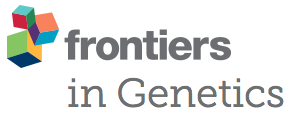 A genetics journal has issued an expression of concern (EOC) for a study after an investigation by its chief editors.
A genetics journal has issued an expression of concern (EOC) for a study after an investigation by its chief editors.
According to the notice in Frontiers in Genetics, the authors of the paper — based at Hokkaido University in Sapporo, Japan — are conducting further experiments to resolve the issues raised by the journal’s investigation.
In February, the same paper received a corrigendum due to errors in the assembly of one of the figures.
Here’s the EOC, issued earlier this week:
An expression of concern on
by Otagaki, S., Kasai, M., Masuta, C., and Kanazawa, A. (2013). Front. Genet. 4:44. doi: 10.3389/fgene.2013.00044
With this notice, Frontiers states its concerns about the reliability of some of the findings of the article “Enhancement of RNA-directed DNA methylation of a transgene by simultaneously downregulating a ROS1 ortholog using a virus vector in Nicotiana benthamiana” published on 2nd April 2013.
In full accordance with Frontiers procedures, following an investigation directed by our Chief Editors, Dr. David Allison and Dr. Richard Jorgensen, the authors are currently performing further experiments to address these issues.
The situation will be updated as soon as the investigation is complete.
And here’s the corrigendum:
We have become aware that the processing of image data in Figures 5A,C including image assembly was done erroneously in this article. To correct these errors, we prepared a new figure from the original data. There are no associated changes to be made in the main text.
The 2013 study, “Enhancement of RNA-directed DNA methylation of a transgene by simultaneously downregulating a ROS1 ortholog using a virus vector in Nicotiana benthamiana,” has yet to be indexed by Clarivate Analytics’ Web of Science, formerly part of Thomson Reuters.
One of the editors who directed the investigation, David Allison, has put significant effort into cleaning up the literature. For years — the field chief editor of Frontiers in Genetics from the University of Alabama at Birmingham — has been tackling problems with the nutrition literature. Although Allison and his team have encountered many barriers to fixing problematic papers — chronicled in this Q&A — their efforts have resulted in several retractions.
Allison was unavailable to comment. Gearóid Ó Faoleán, Ethics and Integrity Manager at Frontiers, told us the EOC notice serves as the publisher’s statement. We’ve also contacted Richard Jorgensen, the other editor mentioned in the retraction notice, a professor emeritus at The University of Arizona in Tucson.
We’ve also reached out to Akira Kanazawa, the study’s last and corresponding author, and will update the post with anything else we learn.
We’ve come across two more recent corrections (issued in 2016 and 2015, respectively) for papers co-authored by Kanazawa for image-related issues: One mentions an incorrect version of a figure being published, and the other changes the text in a figure legend.
Frontiers is on librarian Jeffrey Beall’s list of “potential, possible, or probable” predatory scholarly publishers.
Like Retraction Watch? Consider making a tax-deductible contribution to support our growth. You can also follow us on Twitter, like us on Facebook, add us to your RSS reader, sign up on our homepage for an email every time there’s a new post, or subscribe to our daily digest. Click here to review our Comments Policy. For a sneak peek at what we’re working on, click here.
Did you mean “Frontiers is on librarian Jeffrey Beall’s list of “potential, possible, or probable” predatory scholarly publishers.”
Fixed, thanks!